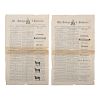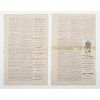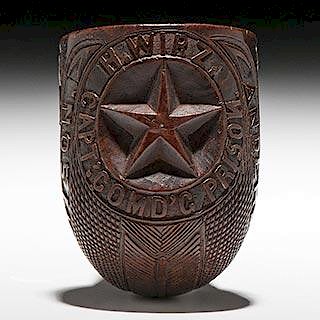The Gringo & Greaser, Manzano, Valencia County, New Mexico, 1884
About Seller
6270 Este Ave.
Cincinnati , OH 45232
United States
With offices in Cincinnati, Cleveland and Denver, Cowan’s holds over 40 auctions each year, with annual sales exceeding $16M. We reach buyers around the globe, and take pride in our reputation for integrity, customer service and great results. A full-service house, Cowan’s Auctions specializes in Am...Read more
Two ways to bid:
- Leave a max absentee bid and the platform will bid on your behalf up to your maximum bid during the live auction.
- Bid live during the auction and your bids will be submitted real-time to the auctioneer.
Bid Increments
| Price | Bid Increment |
|---|---|
| $0 | $25 |
| $500 | $50 |
| $1,000 | $100 |
| $2,000 | $250 |
| $5,000 | $500 |
| $10,000 | $1,000 |
| $20,000 | $2,500 |
| $50,000 | $5,000 |
| $100,000 | $10,000 |
About Auction
Feb 21, 2017 - Feb 22, 2017
Cowan's Auctions dawnie@cowans.com
- Lot Description
The Gringo & Greaser / El Gringo y Greaser. Vol. 1, No. 12 (January 15, 1884), 4 pp, two in English, two in Spanish. 8.25 x 12.75 in.
Charles L. Kusz, Jr. was born in New York about 1849. About 1875 he moved West for the opportunities presented, landing first in Georgetown, CO. There he was a partner in Broad & Kusz, advertising itself as "Brokers, Conveyancers, Real Estate and Mining Agents." Kusz speculated in mining in Leadville about 1879, striking it rich on Fryer Hill. Apparently, however, his (second) wife helped herself to this wealth (or some portion of it) and took off to parts unknown.
He continued prospecting in Colorado for a short time, but by late 1880 or early 1881, he appeared in Manzano, NM. There he set up an assay office and store. He also became a rancher with a registered brand, postmaster of Manzano, notary public, among other pursuits.
Finally he established the very unusual, even in its day, Gringo & Greaser. Each edition was four pages with three columns to the page, two news, one advertisement, set in eight-point italic. The total number of editions seems to be 17 - 16 bi-weekly and one "Extra." The first appeared August 1, 1883, the "Extra" was published August 18 (between Nos. 2 and 3), and the last, March 15, 1884 (Vol. 1, No. 16). According to Hertzog, only about seven of these could be found in a handful of libraries. Today, about ten seem to be available, but one group is found in several libraries as a microfilm copy (8-18, 9-1, 12-1-1883 and 1-1 through 2-15, 1884). Other than these, there are originals of August 15, 1883, December 15, 1883, January 15, 1884 and February 1, 1884 as well as October 1, 1883 as institutional holdings (LOC).
Kusz was assassinated while sitting at the dinner table with his business partner, John Bradford, on March 27, 1884. The shots came from two assassins outside the house, killing Kusz instantly. Bradford was not hurt. He was, however, so stunned and confused, that by the time he and another editor, Mr. Bowman who was in the office at the time, realized what had happened, the gunmen were gone.
The following week, the other newspapermen in the region met in Santa Fe, and passed a resolution, in part "... Whereas, a journalist, if he faithfully performs his duty, is frequently placed in a position where his life is imperiled while laboring for the public and not for his own benefit; and Whereas, the impression prevails that the said Chas. L. Kusz came to his death in consequence of his expression of opinions in a fearless manner; ... be it Resolved, That we, as journalists of the territory of New Mexico, now assembled at Santa Fe, express our profound sorrow for the untimely end of our esteemed brother in the profession... and be it further Resolved, That we express our earnest desire that the assassin shall be sought out and brought to a speedy and merited punishment for this dastardly murder; and ask the friends of a free press to show their purposes in that behalf." On the 29th of March, the Governor of New Mexico offered a $500 reward for the capture and conviction of the killers. All of this to no avail. The assassins were never identified.
Charles Kusz had an acid pen on many occasions. The "Extra" edition of his paper was occasioned by the assassination of Manuel Otero, long-time resident of Manzano. The dispute was over land - Otero being the earlier owner and current resident. He was shot by a man who was "sold" the property by a land grant enterprise. In the edition after the "Extra," Kusz writes in reference to the shooting:
...The terrible affair has made a profound sensation among the people, stirring the popular heart by the wanton sacrifice of such as man as Manuel B. Otero, and arousing general indignation against the entire land grant infamy and all connected with it....Every community has its men who, if the chance presents, will take advantage of the misfortunes of their fellow men. They are the lowest class of society's vampires - dirty-work jackals - willing tools of worse but more prominent men. Of them we shall have little to say; they are only cats-paws, roustabouts for the men who use them - and this latter class, who wield the power for so much mischief, we mean to unmask and, as far as our power lies, fasten upon them the responsibility of their perfidy. They are in high places and in fancied security - evoking immunity from suspicion by the assumption of "that honor which doth hedge in a king." They have grown wealthy by doubtful methods and, aided by that wealth and a fallacious prestige none too honorable, they prostitute the courts, the departments, and even congress itself, to promote their unholy greed of wealth. To them the rights of the people are as nothing weighted in the balance against their insatiable demands,...
He then calls for the land grant system to be dismantled and the claims of the original (Spanish-speaking) inhabitants honored. This... would restore to the people a vast area of their rightful heritage as, beyond all doubt, nine tenths of all so0call grants, as well as their so-called owners, are in 'A league with death and a covenant with hell.' Thus the rights of the people, as well as of bona fide grantees, or their heirs, would be jealously guarded: much contention and bloodshed would be prevented, and the courts, departments and congress relieved of a festering source of corruption and injustice.
Some of Kusz's articles were tongue-in-cheek:
Manzano is one of the oldest towns in the Territory... Its buildings are substantial showing a solid growth. The style of architecture is mud-gothic, the smoke stacks protruding through the roofs... Manzano is the centre of a grand system of paper railways, grapevine telegraphs and old woman telephones.... It is famous for its weather, hardly ever being without a spell. Manzano is periodically headquarters for most of the sheriffs and constables of the territory. Its trade extends in every direction except upwards and outward.... The people are very sociable, whole families visiting each other twice a year and staying six months every time. Manzano is nothing if not hospitable, a score of live dogs lying before every man's gate to speed the parting guest.... (Vol. 1, No. 12)
It is unknown why he gave his newspaper the title he did - both terms being somewhat derogatory. But it did get people's attention. Throughout its (too) short run, he supported the Hispanic residents as much as the Anglo ones (leading one to suspect the title is tongue-in-cheek, also). Every issue had items of note about the local non-Anglo culture.
He poked fun at everyone - clergy and organized religion, other publishers, other humans, and himself. It is all very well to tell young people to "Go to work! go to work!" but what sort of way is that to treat kid gloves or soft white hands, to say nothing of encouraging the old folks in habits of indolence and idleness?
However, when he was in a righteous furor, watch out! In Vol. 1, No. 11, Some lousy, fistulous, carrion-scented, worn-eaten and otherwise deformed human miscarriage, walking on hind legs and having a remote resemblance to the animal man, has added, another to the horrid list of his infamous acts by cutting off the nose of a colt.... Such a wretch ought to me mashed to a jelly between two limburg cheeses without benefit of clergy...
Although not likely to have triggered the assassination, Kusz did not mince words. He was, however, investigating a rash of cattle thefts. The prevailing opinion of the town at the time was that the cattle rustlers were the ones responsible for shooting the editor (he must have been close to exposing them).
References:
Hertzog, Peter. The Gringo & Greaser. Santa Fe: Phil Cooke, 1864 (The Press of the Territorian). No. 6 of a Series of Western Americana.
Library of Congress, Chronicling America, Historic American Newspapers.
Provenance: N. Flayderman and Co., Inc.Paper somewhat toned and brittle. Old repair on center fold of both sheets. Could use stabilizing. References: Hertzog, Peter. The Gringo & Greaser. Santa Fe: Phil Cooke, 1864 (The Press of the Territorian). No. 6 of a Series of Western Americana. Library of Congress, Chronicling America, Historic American Newspapers. WorldCat.Condition
- Shipping Info
-
SHIPPING. At the request of the buyer, Cowan's will authorize the shipment of purchased items. Shipments usually occur within two weeks after payment has been received. Shipment is generally made via UPS Ground service. Unless buyer gives special instructions, the shipping method shall be at the sole discretion of Cowan's Auctions, Inc.. Cowan's is in no way responsible for the acts or omissions of independent handlers, packers or shippers of purchased items or for any loss, damage or delay from the packing or shipping of any property.
-
- Buyer's Premium



 EUR
EUR CAD
CAD AUD
AUD GBP
GBP MXN
MXN HKD
HKD CNY
CNY MYR
MYR SEK
SEK SGD
SGD CHF
CHF THB
THB












